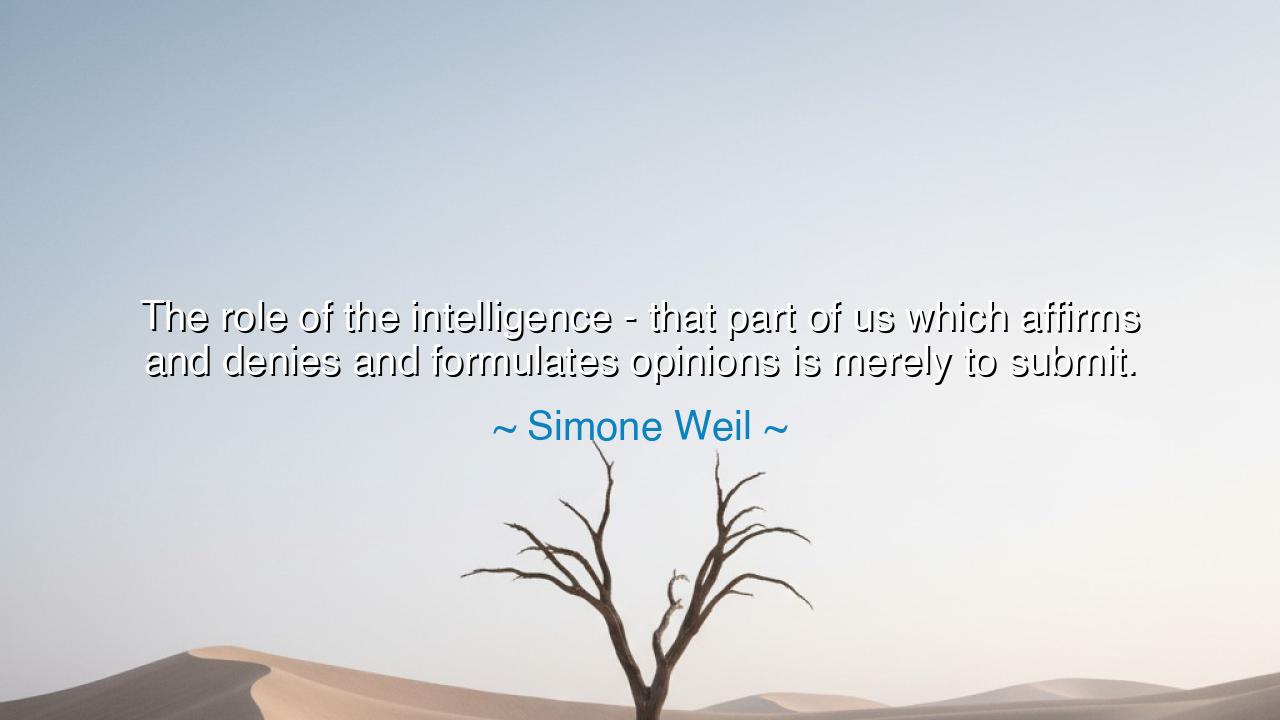
The role of the intelligence - that part of us which affirms and
The role of the intelligence - that part of us which affirms and denies and formulates opinions is merely to submit.






In an age torn between pride of intellect and hunger for truth, there spoke a woman whose spirit burned with quiet ferocity — Simone Weil, the philosopher-mystic who sought wisdom not in conquest, but in surrender. She once declared: “The role of the intelligence — that part of us which affirms and denies and formulates opinions — is merely to submit.” These words, gentle yet profound, speak of a paradox that lies at the heart of all wisdom: that true understanding begins not in assertion, but in humility; not in the clamor of thought, but in the stillness of submission before what is real.
To Simone Weil, intelligence was a sacred faculty — but one easily corrupted by pride. She saw that the mind, with its endless capacity to affirm and deny, to form opinions and judgments, often mistakes its own creations for truth. The intellect, she said, is like a brilliant but unruly servant; it hungers to control, to define, to dominate the mystery of existence. Yet the highest task of this faculty is not mastery, but obedience — obedience to reality, to the divine order that lies beyond our own reasoning. To “submit” is not to abandon thought, but to refine it, to train it to bow before what it cannot invent but only receive.
This teaching finds its roots in the ancient traditions of both philosophy and faith. The Greeks spoke of sophrosyne — moderation, the harmony of mind that comes from recognizing one’s limits. In the Hebrew scriptures, the prophet stands silent before God, knowing that human understanding cannot encompass the infinite. And in the East, the sages of Taoism taught that to grasp the Tao, one must cease striving to control it. Weil, standing at the crossroads of these traditions, proclaimed that the intelligence fulfills its divine purpose only when it yields — when it becomes not the architect of illusions, but the vessel of truth.
Consider, then, the story of Isaac Newton, who after uncovering the laws of motion and gravity — the very pillars of modern science — confessed that he felt “like a child playing by the seashore, finding a smoother pebble or a prettier shell, while the great ocean of truth lay all undiscovered before me.” Here is submission in its purest form. Newton, one of the greatest minds in history, recognized that even the most luminous intellect is but a flicker before the vastness of reality. The role of the intelligence, as Weil reminds us, is not to seize the ocean, but to kneel before it in wonder.
Weil herself lived this philosophy not as theory, but as practice. She labored in factories, joined the oppressed, and starved herself in solidarity with those who suffered. For her, submission was not weakness but participation — the act of aligning the self with the rhythm of the universe, of learning through humility what pride can never know. The intelligence, when it submits, becomes a bridge between heaven and earth; when it rebels, it builds walls of delusion. In this way, her life was both her reasoning and her prayer.
Her teaching warns us of the peril of an age intoxicated by its own cleverness. Today, the mind is praised for its ability to analyze, categorize, and command. Yet amid our mastery of information, how easily we lose sight of truth itself. We are filled with opinions, yet starved for wisdom; we affirm and deny endlessly, yet rarely listen. Weil’s words call us back to stillness — to the sacred act of attention, which she called “the rarest and purest form of generosity.” For in attention, the intelligence submits; it listens not to itself, but to the world as it truly is.
So let this be the teaching handed down: Use your intelligence not as a tyrant, but as a servant. Do not mistake thought for truth, nor opinion for understanding. Before every mystery — of nature, of art, of love, of suffering — let your mind bow in reverence. Ask not “How can I master this?” but “What is this asking of me?” Practice silence; practice attention; practice humility before the real. For in submitting to truth, you do not diminish the mind — you ennoble it. The intelligence, rightly ordered, becomes not the maker of illusions, but the mirror of the divine.
And thus, as Simone Weil taught, the highest act of the mind is not to conquer, but to yield — to open itself like a vessel before the rain, to receive rather than to dictate. In this sacred submission, thought becomes prayer, knowledge becomes love, and the human spirit, once blinded by its own brilliance, begins at last to see.






AAdministratorAdministrator
Welcome, honored guests. Please leave a comment, we will respond soon